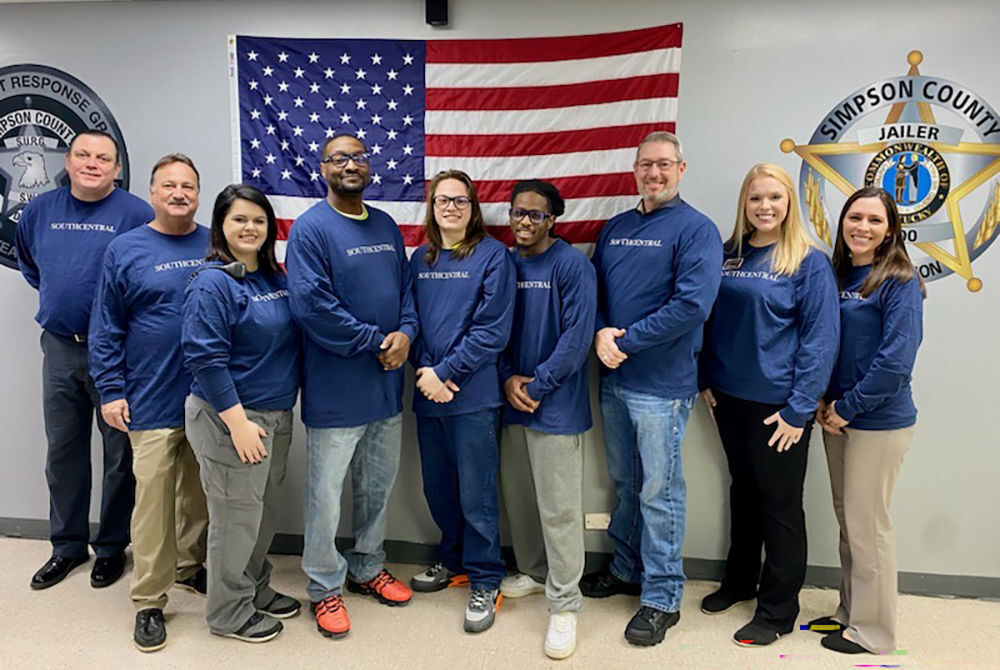‘Pioneers.’ SKYCTC partners with Simpson jail to give inmates college education
Published 9:48 am Monday, January 9, 2023

- Simpson County Detention Center inmates, jailers and SKYCTC administrators gather ahead of the start of the fall 2023 semester. From left: Ray Haddix, Simpson County adult education coordinator; Brent Deweese, Simpson County chief deputy jailer; Emily Casada, Simpson County Detention Center deputy; Jerry Martin, student; Alex Duong, student; Cornell Gist, student; Eric Vaughn, Simpson County jailer; Kelcie Richart, SKYCTC Franklin-Simpson Center campus director; and Samantha Mallory, SKYCTC Educational Opportunity Center associate director.
After having a daughter at 16, Alex Duong dropped out of school. He had no choice, he said. He needed to work to support his family.
When he arrived at the Simpson County Detention Center years later, he finally earned his GED.
And now, Duong is one of three SCDC inmates joining the SKYCTC campus community – online.
Duong, 25, Cornell Gist, 32, and Jerry Martin, 42, are part of a pilot program put on by SCDC and SKYCTC called SKY DIVE, or Southcentral Kentucky Developing the Incarcerated with a Valuable Education.
SKY DIVE is designed to reduce recidivism rates and give inmates a better chance of success upon release.
“It’s cheaper to educate than to incarcerate,” said SCDC Jailer Eric Vaughn.
Vaughn helped come up with the program idea when Samantha Mallory paid him a visit.
Mallory, associate director of SKYCTC’s TRIO Educational Opportunity Centers program, works to give adults access to education in places like jails and rehab centers where it might not be otherwise provided.
She visited Vaughn to explain how she could prepare inmates to apply for and attend college upon release, but he suggested that they go ahead and start school while still in jail.
Mallory and Kelsie Richart, campus director of SKYCTC’s Franklin-Simpson Center, welcomed the idea.
Duong, Martin and Gist were selected from 14 applicants based on disciplinary standings and placement exam scores demonstrating their college readiness. They filled out the FAFSA and took all the other steps traditional college students take, Richart said, “except they’re inmates.”
During the first semester, the three students will have two hours in the computer lab a day to take their first online course, which is focused on building foundational skills like writing college essays and learning about career options.
If the students have a lot of extra time, Richart said they might consider adding a course.
“We’re kind of building the boat as we’re sailing,” she said. “We want to make sure that we’re engaging the students and meeting them where they are. … We’ll make sure that their courses are bang for their buck.”
Vaughn described the three students as “pioneers.”
“I think it’s cool that I get to set a foundation for myself and others,” Duong said. “When I succeed in this, it’s going to be a door to everyone else.”
It’s a little overwhelming, Duong said, but he knew he had to jump at the opportunity in spite of any doubts.
“Not only would it make my family proud, but it would help my future,” he said. “I know it’s going to better me.”
The goal is for SKY DIVE to become an approved Prison Education Program by the fall 2023 semester, which would allow inmates to apply for and use Pell Grants to fund their college courses.
Incarcerated adults haven’t been eligible for Pell Grants since 1994, but in 2021, Congress reinstated access beginning in fall 2023.
In the meantime, inmates are using commissary funds to pay for tuition, Vaughn said. Commissary funds come from a percentage of the profits a jail makes on items sold to inmates, and are earmarked for services that contribute to their betterment, he added.
Duong is focusing on general education courses for now, until he figures out his career path. Martin plans on getting an Industrial Maintenance degree to further his manufacturing career. Gist is pursuing either psychology or sociology on his road to become a therapist.
Flexibility was a program priority, Richart said.
“It’s our goal to have these students have a springboard to a career,” she said. “The courses that we hope that they will take while they’re still incarcerated are general education courses, which can transfer to any postsecondary institution in Kentucky.”
Richart hopes to add about 10-12 students per semester in the future, but nothing is set in stone yet. Right now, her and Mallory are taking on the program on top of their other daily responsibilities, and need to make sure that SKY DIVE is a success before expanding.
“Until we get a good footing, until we see how these students progress … we’re looking at small cohorts, specifically because we want to make sure that we provide them with the best student support services, and that’s what we can handle right now,” Richart said.
Success will be based on grades and the input of Ray Haddix, a Simpson County adult education coordinator who will supervise the students. Haddix already helps SCDC inmates during GED testing, and will serve as the “boots on the ground” during the pilot semester.
“If he comes back to us, and he says, ‘They’re really overwhelmed, they’re struggling, this is too hard for them to be doing this online,’ that’s going to influence our decision,” Mallory said.
“But he’s very confident that they’re going to be successful. I think that even if they have those moments of doubt or worry, that he’s going to be able to help them push through and meet their goals.”






